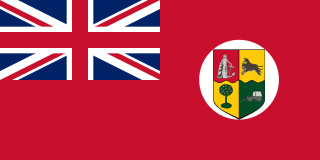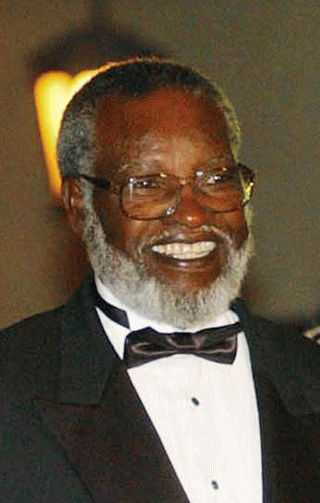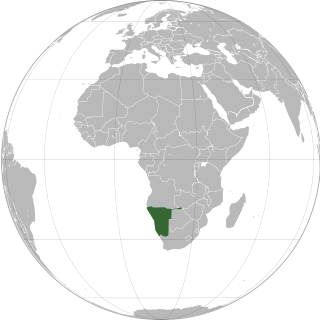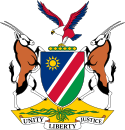
Namibia, officially the Republic of Namibia, is a country in Southern Africa. Its western border is the Atlantic Ocean. It shares land borders with Zambia and Angola to the north, Botswana to the east and South Africa to the south and east. Although it does not border Zimbabwe, less than 200 metres of the Botswanan right bank of the Zambezi River separates the two countries. Namibia gained independence from South Africa on 21 March 1990, following the Namibian War of Independence. Its capital and largest city is Windhoek. Namibia is a member state of the United Nations (UN), the Southern African Development Community (SADC), the African Union (AU) and the Commonwealth of Nations.

South West Africa was a territory under South African administration from 1915 to 1990, after which it became modern-day Namibia. It bordered Angola, Botswana, South Africa, and Zambia.

The South West Africa People's Organisation, officially known as the SWAPO Party of Namibia, is a political party and former independence movement in Namibia. Founded in 1960, it has been the governing party in Namibia since the country achieved independence in 1990. The party continues to be dominated in number and influence by the Ovambo ethnic group.

Samuel Shafiishuna Daniel Nujoma, is a Namibian revolutionary, anti-apartheid activist and politician who served three terms as the first President of Namibia, from 1990 to 2005. Nujoma was a founding member and the first president of the South West Africa People's Organization (SWAPO) in 1960. Prior to 1960, SWAPO was known as the Ovambo People's Organisation (OPO). He played an important role as leader of the national liberation movement in campaigning for Namibia's political independence from South African rule. He established the People's Liberation Army of Namibia (PLAN) in 1962 and launched a guerrilla war against the apartheid government of South Africa in August 1966 at Omungulugwombashe, beginning after the United Nations withdrew the mandate for South Africa to govern the territory. Nujoma led SWAPO during the lengthy Namibian War of Independence, which lasted from 1966 to 1989.

Elections in Namibia determine who holds public political offices in the country. Namibia is a semi-presidential representative democratic republic. It runs direct elections every five years for the position of the president and seats in the National Assembly, and every six years for the Regional Councils and the distribution of seats in local authorities. The National Council is elected indirectly by the constituency councillors of Namibia's 14 regions.

The Rehoboth Volksparty was a political party in Namibia. It was founded in 1968 by Hans Diergaardt, on the basis of the Rehoboth Taxpayers Association.
Herman Andimba Toivo ya Toivo was a Namibian anti-apartheid activist, politician and political prisoner. Ya Toivo was active in the pre-independence movement, and is one of the co-founders of the South West African People's Organisation (SWAPO) in 1960, and before that, its predecessor the Ovamboland People's Organization (OPO) in 1959.

The National Council is the upper chamber of Namibia's bicameral Parliament. It reviews bills passed by the lower chamber and makes recommendations for legislation of regional concern to the lower chamber.

The South West Africa National Union (SWANU) is a Namibian political party founded in 1959. Most of its members came from the Herero people, while fellow independence movement SWAPO was mostly an Ovambo party. The party's president is Charles Katjivirue.
The South East Atlantic Fisheries Organisation (SEAFO) is an organization that maintains controls over fishing and fishing related acts in the Southeastern Atlantic Ocean.

Lesbian, gay, bisexual, and transgender+ (LGBT+) persons in Namibia face legal challenges not experienced by non-LGBT residents. Discrimination based on sexual orientation and gender identity is not banned in Namibia, and households headed by same-sex couples are not eligible for the same legal protections available to opposite-sex couples.

Chief Hosea Katjikururume Komombumbi Kutako, was an early Namibian nationalist leader and a founder member of Namibia's first nationalist party, the South West African National Union (SWANU).
Clemens Kapuuo was a Namibian school teacher, shopkeeper, president of the Democratic Turnhalle Alliance (DTA), now called Popular Democratic Movement (PDM), and chief of the Herero people of Namibia. Kapuuo was one of the leading opponents of South African rule of his country until his assassination following the Turnhalle Constitutional Conference.
The National Convention was an alliance of political parties in South West Africa. It was formed in 1971 when the International Court of Justice ruled that South African rule in Namibia was illegal, and it consisted of various pro-independence groups and parties, including the South West Africa National Union (SWANU), the South West Africa Peoples Organization (SWAPO) and the National Unity Democratic Organisation (NUDO) formed the National Convention as a united front against South African rule. Clemens Kapuuo was its first head.
Mburumba Kerina was a Namibian politician and academic. He was a co-founder of SWAPO, NUDO, and FCN, and the founder of a host of smaller political parties. For independent Namibia, he was a member of Namibia's Constituent Assembly, as well as the National Assembly and the National Council. Kerina coined the name "Namib" for the independent state "Namibia" on the territory of South West Africa.
The National Convention was the first republican legislative body of the French Revolution, that lasted from 21 September 1792 to 26 October 1795.
St Barnabas was an Anglican mission station, church, and school in Windhoek, the administrative centre of South West Africa. The school was situated in the Old Location suburb. When Old Location was closed for blacks in 1968 the existing buildings and institutions, among them St Barnabas, were destroyed.

Human rights in Namibia are currently recognised and protected by the Namibian constitution formed in 1990 by a 72-seat assembly. The assembly consisted of differing political parties. After a draft, the constitution was agreed upon by all members of the seven political parties involved. 21 March 1990 marks the first day Namibia operated under the Constitution and also marks the recognition of Namibia as an independent nation. Chapter 3 of the constitution entitled Fundamental Human Rights and Freedoms, also referred to as the Bill of Rights, outlines the human rights of all Namibian citizens.

Mexico–Namibia relations are the diplomatic relations between the United Mexican States and the Republic of Namibia. Both nations are members of the United Nations.









